★★★★½
“Angel of vengeance”
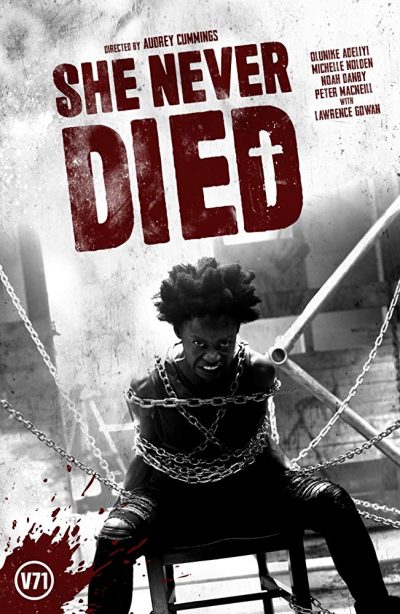
 This is neither a prequel nor a sequel to He Never Died, but is clearly related, and takes place in the same universe. Like its predecessor, it was written by Jason Krawczyk, who hands the directorial reins over to Cummings for this. And it probably works better as a result. I tend to think having a separate writer and director allows each to build on the other’s talents, while countering the weaknesses. In particular, He, which starred Henry Rollins, didn’t have quite enough plot to sustain it. That isn’t an issue here, resulting in improved pacing. Combine this with the ultimate “give no damns” performance at its core, and you’ve got one of the best action heroine films of 2019.
This is neither a prequel nor a sequel to He Never Died, but is clearly related, and takes place in the same universe. Like its predecessor, it was written by Jason Krawczyk, who hands the directorial reins over to Cummings for this. And it probably works better as a result. I tend to think having a separate writer and director allows each to build on the other’s talents, while countering the weaknesses. In particular, He, which starred Henry Rollins, didn’t have quite enough plot to sustain it. That isn’t an issue here, resulting in improved pacing. Combine this with the ultimate “give no damns” performance at its core, and you’ve got one of the best action heroine films of 2019.
That performance is Adeliyi’s portrayal of “Lacey”, whose real name we learn at the end, and which will make some sense to students of Biblical lore. Like Rollins’s character, she plays an immortal being, doomed to wander the planet for eternity, sustained only on human flesh. However, she operates on a code, eating only scumbags. This still brings her to the attention of local authorities, in particular the thoroughly world-weary Detective Godfrey (MacNeill). But when he discovers Lacey’s nature, he makes the ill-fated decision to weaponize her, and points her in the direction of a sex-trafficking ring run by Terrance (Danby), which he has been unable to take down by more formal methods. Complicating matters is the gang’s victim, Suzzie (Madeira), whom Lacey encounters during her first mission, and who becomes something of her acolyte.
Lacey is potentially among the most taciturn bad-asses of the genre, a woman of few words, whose remarkable healing powers allow her to take a baseball bat to the head, and then discuss the mild irritation of having to wait for a detached retina to repair itself. No wonder Suzzie is confused, wondering “Are you just a jacked-up lady blitzed out of her mind? Or a government experiment on the lam? Robot? Zombie? Vampire? You sound like a vampire.” The contrast between the pair, one hyper almost to the point of manic, the other deader than deadpan, is a joy. Seeing Adeliyi in action is another. This film doesn’t shortchange her diet, and Cummings background in horror is apparent. About the only person who can half-stand up to Lacey is the person in charge of the traffickers – which makes me wonder if they, too, may be more than human.
It’s one of the intriguing questions which this poses. Particularly at the end, after things appear to have been tied up nicely, the story opens an entire case of cans of worms, with both Godfrey and Lacey having encounters that’ll leave you going “Hmmm…” And that’s not even including the Bikers of the Apocalypse. While it’s definitely not necessary to have seen He Never Died, the cross-over of information may slightly enhance your information of both. I’m wondering if it’s all pointing towards a third entry – They Never Died?- in which the characters from these two films team up. If so, where do I start the queue?
Dir: Audreey Cummings
Star: Olunike Adeliyi, Peter MacNeill, Kiana Madeira, Noah Danby
Screened at Phoenix FearCon 2019






 We know very well that, on low-budget films, people have to wear many hats. Hell, my IMDb entry began when a film I was supposed to be helping my wife produce, had an actor drop out. You can only respect those who can turn their hands to multiple jobs. And, yet… There’s a point at which it become self-defeating, because nobody can be
We know very well that, on low-budget films, people have to wear many hats. Hell, my IMDb entry began when a film I was supposed to be helping my wife produce, had an actor drop out. You can only respect those who can turn their hands to multiple jobs. And, yet… There’s a point at which it become self-defeating, because nobody can be 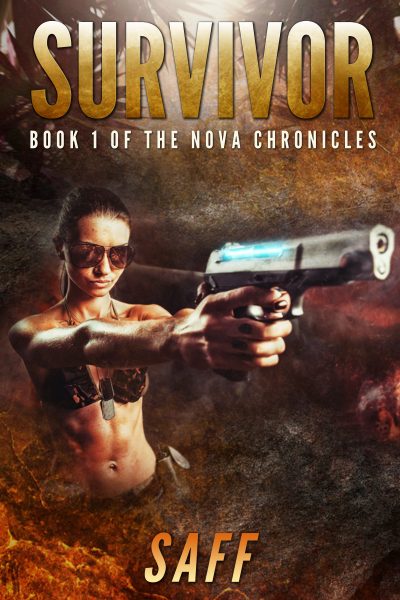 Nova is a bounty hunter, smuggler and generally survivor of life in the grey areas of legality. In need of a quick buck to fix her space-ship, she takes on the hunt for a couple of escaped fugitives. She locates them working in an archaeological dig being run by the Confederacy – which is odd, since the planet in question was supposedly never inhabited. An unfortunate translation error ends up helping unleash a long-buried race of reptiloid extra-terrestrials, the Ancients – a species with both the inclination and the ability to wage genocidal war on the rest of the galaxy. And Nova is the only one left who can stop them.
Nova is a bounty hunter, smuggler and generally survivor of life in the grey areas of legality. In need of a quick buck to fix her space-ship, she takes on the hunt for a couple of escaped fugitives. She locates them working in an archaeological dig being run by the Confederacy – which is odd, since the planet in question was supposedly never inhabited. An unfortunate translation error ends up helping unleash a long-buried race of reptiloid extra-terrestrials, the Ancients – a species with both the inclination and the ability to wage genocidal war on the rest of the galaxy. And Nova is the only one left who can stop them. When you think of drugs, terrorism and South America, Colombia probably comes first to mind, thanks to Pablo Escobar and his cartel pals. However, it’s far from the only country in the region with a troubled history. Peru has had its fair share of strife: it produces virtually as much cocaine, and the Marxist guerillas of the Shining Path movement fought a long, bloody war against the government through the eighties. It’s during this time that the novel begins. Young girl Nina has her father killed by soldiers hunting the guerillas in her rural village, and her brother Miguel vanishes to join the Shining Path.
When you think of drugs, terrorism and South America, Colombia probably comes first to mind, thanks to Pablo Escobar and his cartel pals. However, it’s far from the only country in the region with a troubled history. Peru has had its fair share of strife: it produces virtually as much cocaine, and the Marxist guerillas of the Shining Path movement fought a long, bloody war against the government through the eighties. It’s during this time that the novel begins. Young girl Nina has her father killed by soldiers hunting the guerillas in her rural village, and her brother Miguel vanishes to join the Shining Path. After the success of
After the success of 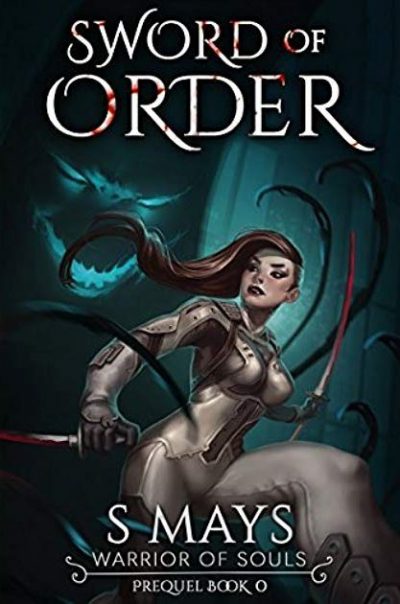 Book 0 in the series? It seems a little odd, as this obviously leads in to the “first” book – Curse of Souls, published in September 2017 – yet Sword came out just three months later. Reading the synopsis, it seems as if Curse may be focused on a different character: college student Sverre Walker, who encounters Jessica Luvkrafft, warrior for the Order of Mankind. Sword is the story of how Jessica became that warrior.
Book 0 in the series? It seems a little odd, as this obviously leads in to the “first” book – Curse of Souls, published in September 2017 – yet Sword came out just three months later. Reading the synopsis, it seems as if Curse may be focused on a different character: college student Sverre Walker, who encounters Jessica Luvkrafft, warrior for the Order of Mankind. Sword is the story of how Jessica became that warrior. Katelyn Wolfraum is a German expat, who was working as a field agent for MI-6, until an unfortunate incident just before the war, involving a member of the British Royal Family, left her persona non grata with the authorities. Fast forward to 1941, the depths of World War II, and she’s an intelligence analyst under Colonel Lyons and Major Trufflefoot in the North African desert. With Field-Marshall Rommel tearing across the terrain in a blitzkrieg, she finds herself trapped deep behind enemy lines, along with a motley international band of Allied soldiers. When they discover evidence of a Nazi super-weapon about to be deployed, Kat and her colleagues decide to take the fight to the enemy and sabotage the Third Reich’s plans. But complicating matters is the presence of Kat’s foster father, who is now a high-ranking officer in the SS, tasked with ensuring the saboteurs are stopped.
Katelyn Wolfraum is a German expat, who was working as a field agent for MI-6, until an unfortunate incident just before the war, involving a member of the British Royal Family, left her persona non grata with the authorities. Fast forward to 1941, the depths of World War II, and she’s an intelligence analyst under Colonel Lyons and Major Trufflefoot in the North African desert. With Field-Marshall Rommel tearing across the terrain in a blitzkrieg, she finds herself trapped deep behind enemy lines, along with a motley international band of Allied soldiers. When they discover evidence of a Nazi super-weapon about to be deployed, Kat and her colleagues decide to take the fight to the enemy and sabotage the Third Reich’s plans. But complicating matters is the presence of Kat’s foster father, who is now a high-ranking officer in the SS, tasked with ensuring the saboteurs are stopped. I could have sworn I’d seen this before, to the point where I almost skipped over it on Amazon Prime. But on checking, appears not. Did I watch it, and just not review it? Or does it only
I could have sworn I’d seen this before, to the point where I almost skipped over it on Amazon Prime. But on checking, appears not. Did I watch it, and just not review it? Or does it only 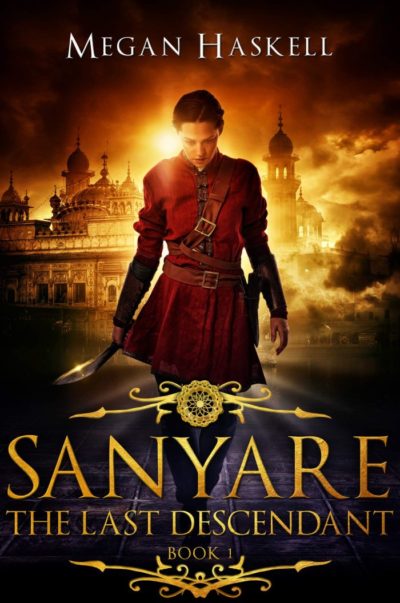 Nuriel Lhethannien, known as Rie, is an orphan human in a multi-verse, populated by elves, vampires known as sidhes, trolls and a host of other magic creatures. She has a job as a messenger for King Othin, the ruler of the Upper Realm. But when she’s attacked by assassins from the Shadow Realm, she’s in deep trouble. For such is the enmity between the realms, that Othin decreed, “Anyone in contact with the Shadow Realm, in any way, would be executed.” To save her own life, Rie has to become even more of an outlaw, and journey down below, seeking to find the truth about who attacked her and why.
Nuriel Lhethannien, known as Rie, is an orphan human in a multi-verse, populated by elves, vampires known as sidhes, trolls and a host of other magic creatures. She has a job as a messenger for King Othin, the ruler of the Upper Realm. But when she’s attacked by assassins from the Shadow Realm, she’s in deep trouble. For such is the enmity between the realms, that Othin decreed, “Anyone in contact with the Shadow Realm, in any way, would be executed.” To save her own life, Rie has to become even more of an outlaw, and journey down below, seeking to find the truth about who attacked her and why.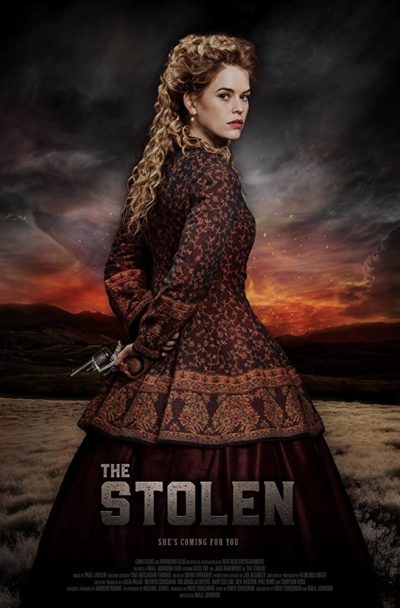 Rarely has such promise been so spectacularly and vigorously squandered. For this starts well enough. In 19th century New Zealand, English ex-pat Charlotte (Eve) is settling into a new life with her husband and newborn child. This is upturned when a midnight raid leaves her husband dead and the baby kidnapped. Months later, after everyone else has moved on, she gets a ransom demand in the mail, and she tracks its source to Goldtown. This remote outpost is truly an Antipodean version of the Wild West, a rough-edged mining town run by Joshua McCullen (Davenport). Braving all manner of threats – not least, that the only other women there are prostitutes – Charlotte makes the perilous journey to the frontier settlement in search of her son.
Rarely has such promise been so spectacularly and vigorously squandered. For this starts well enough. In 19th century New Zealand, English ex-pat Charlotte (Eve) is settling into a new life with her husband and newborn child. This is upturned when a midnight raid leaves her husband dead and the baby kidnapped. Months later, after everyone else has moved on, she gets a ransom demand in the mail, and she tracks its source to Goldtown. This remote outpost is truly an Antipodean version of the Wild West, a rough-edged mining town run by Joshua McCullen (Davenport). Braving all manner of threats – not least, that the only other women there are prostitutes – Charlotte makes the perilous journey to the frontier settlement in search of her son.